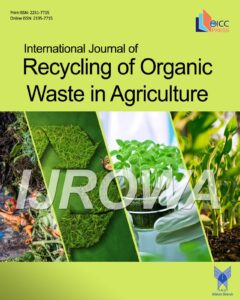Recycling of sugarcane industries byproducts for preparation of enriched pressmud compost and its influence on growth and yield of rice (Oryza sativa L.)
Authors
-
D. Kalaivanan
*
 1
1
- K. Omar Hattab 2
Abstract
Purpose Field experiment was conducted to investigate the effect of enriched pressmud compost prepared from sugarcane industries byproducts on soil nutrient availability, growth, yield parameters and yield of rice. Method The effect of five levels of pressmud compost, viz., 0.00, 1.25, 2.50, 3.75 and 5.00 t ha-1 in two varieties, viz., ADT 36 and ADT 43 and a hybrid ADTRH 1 duringthe Kharif season of 2009 was studied. The experiment was conducted in a factorial randomized block design with three replications. Results The results of the field experiment revealed that the hybrid ADTRH 1 manifested higher grain and straw yield, whereas the variety ADT 43 and ADT 36 registered lower grain and straw yields, respectively. With regard to the enriched pressmud compost, the application of 1.25 t ha-1 of enriched pressmud compost recorded higher straw and grain yields and it was comparable with 2.50 t ha-1 of enriched pressmud compost. Nutrient availability, growth, yield and efficiency parameters of rice were comparable with application of 1.25 and 2.50 t ha-1 of enriched pressmud compost. Conclusion Considering the input cost, incorporation of 1.25 t ha-1 enriched pressmud compost as basal along with required remaining nitrogen through inorganic fertilizer as top dressing in three splits may be recommended for rice crop to realize maximum yield in kuruvai (kharif) season



